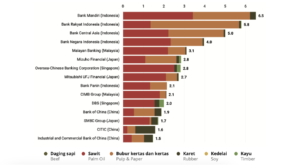Indonesian palm oil developer’s efforts to conserve ‘forest carbon’ abuse community rights
17 January, 2014
PRESS INFORMATION – For immediate release
A new report, launched today, shows that efforts by one of Indonesia’s largest palm oil companies, PT SMART, to set aside forests as ‘carbon stores’ in the centre of Borneo are flawed. Indigenous peoples and local fisherfolk are objecting to the way these impositions curtail their land rights and restrict their livelihoods.
PT SMART trades under the Sinar Mas brand and is part of the Singapore-based Golden Agri Resources group (GAR) which also includes Asia Pulp and Paper (APP) and Sinar Mas Forestry.
After being strongly criticised by environmental campaigners for clearing forests and planting on peatlands, which led companies like Unilever and Nestlé to temporarily suspend purchases from the company, GAR agreed to stop such activities. It then adopted a new Forest Conservation Policy, by which it assesses the carbon in forests in its concessions and sets aside areas of ‘high carbon stocks’.
The new policy is now being piloted in one of PT SMART’s eight oil palm concessions in West and Central Kalimantan, PT Kartika Prima Cipta (PT KPC) in Kapuas Hulu district, an upland area famous for its large lakes, extensive peat swamps and productive inland fisheries. The PT KPC concession overlaps the lands of Dayak and Malay communities. Both PT SMART and GAR are members of the Roundtable on Sustainable Palm Oil (RSPO), whose standards require that companies respect community rights and only acquire their lands subject to their ‘free, prior and informed consent.’
Norman Jiwan, Director of the Indonesian ecological justice NGO, TUK-Indonesia, and himself a Dayak from West Kalimantan, says:
“Our field studies show that PT KPC got communities to surrender their lands without due process. Promised benefits for accepting oil palm have been slow to be realised and smallholdings are only half as extensive as expected. Yet the farmers can’t easily appeal the unfair land-grabs as none have a copy of the contract under which their lands were taken.”
Marcus Colchester, Senior Policy Advisor of the international human rights group, the Forest Peoples Programme, says:
“The aims of the RSPO standard and GAR’s new Forest Conservation Policy (FCP) may be well-intentioned but they need to be observed in practice, not just on paper. Unfortunately, in this case, lands were taken unfairly and now the company is seeking to impose ‘high carbon stock’ set-asides which will further restrict rights and livelihoods. We alerted the company to these problems in July last year and made clear recommendations about what had to be done to correct these failings, but the company has been extremely slow to act.”
This ‘Forest Conservation Policy’ is now also being applied by other major oil palm and pulpwood plantation companies like Asia Pulp and Paper and the world’s largest palm oil trading house, Wilmar. A number of companies in the Consumer Goods Forum including Unilever also plan to require ‘High Carbon Stock’ set-asides. Says Colchester:
“The lessons learned from GAR’s mistakes need to be carefully heeded by other companies seeking to apply the same approach. They must start by respecting communities’ land rights, securing their livelihoods and making clear from the start which areas they plan to take over for both plantations and conservation. They also have to be transparent about the terms of land deals. Only then can communities make sensible decisions about whether or not to allow these operations on their lands.”
Anton Widjaya, Director of WALHI-West Kalimantan, the local chapter of Friends of the Earth, said:
“These kinds of projects are only going to work once local and national governments first recognise peoples’ rights and companies understand that they are there as guests of the local communities rather than as feudal landlords. This is what it means when we say that all such operations require communities’ free, prior and informed consent.”
Ends





Leave a Reply
Want to join the discussion?Feel free to contribute!